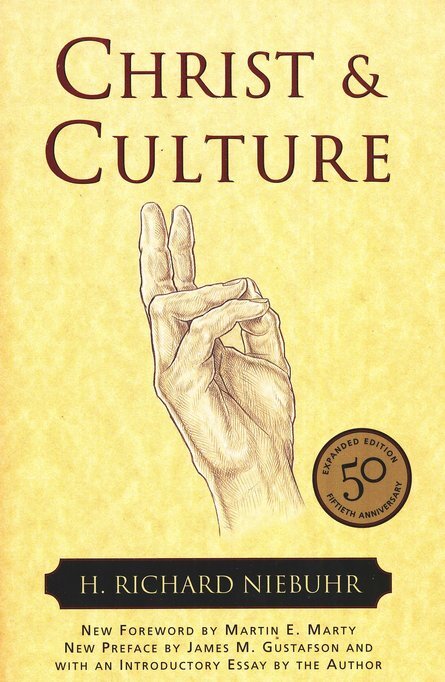H. Richard Niebuhr, Christ and Culture. Harper and Row, 1956.
Referenced in: Christian Political Theory and Church-State Relations
LifeandLeadership.com Summary
This is expression of how Christians engage culture has been the standard for over half a century. Below is a summary of the Niebuhr’s five typologies of how churches engage the larger culture:
- Christ against Culture – For the exclusive Christian, history is the story of a rising church or Christian culture and a dying pagan civilization.
- Christ of Culture – For the cultural Christian, history is the story of the Spirit’s encounter with nature.
- Christ above Culture – For the synthesist, history is a period of preparation under law, reason, gospel, and church for an ultimate communion of the soul with God.
- Christ and Culture in Paradox – For the dualist, history is the time of struggle between faith and unbelief, a period between the giving of the promise of life and its fulfillment.
- Christ Transforming Culture – For the conversionist, history is the story of God’s mighty deeds and humanity’s response to them. Conversionists live somewhat less “between the times” and somewhat more in the divine “now” than do the followers listed above. Eternity, to the conversionist, focuses less on the action of God before time or life with God after time, and more on the presence of God in time. Hence the conversionist is more concerned with the divine possibility of a present renewal than with conservation of what has been given in creation or preparing for what will be given in a final redemption.
Almost all works on church and culture since Niebuhr have deferred to him, and in some respect have simply interacted with his viewpoint as a basis for offering a nuance on his grid. Among these are D. A. Carson’s Christ and Culture Revisited, Craig Carter’s Rethinking Christ and Culture, and T. M. Moore’s Culture Matters.
From the Publisher
This 50th-anniversary edition, with a new foreword by the distinguished historian Martin E. Marty, who regards this book as one of the most vital books of our time, as well as an introduction by the author never before included in the book, and a new preface by James Gustafson, the premier Christian ethicist who is considered Niebuhr’s contemporary successor, poses the challenge of being true to Christ in a materialistic age to an entirely new generation of Christian readers.
About the Author
H. Richard Niebuhr was one of the most influential American Protestant theologians of the 20th century and a legendary professor at Yale who was considered a leading authority on ethics and the American church. He was a passionate advocate for living out one’s Christian faith authentically in the context of real world of today. He influenced many of our leading contemporary ethical leaders such as Stephen Carter, Garry Wills, and Michael Novak.
The younger brother of the theologian Reinhold Niebuhr, H. Richard was educated at Eden Theological Seminary and Washington University in St. Louis, Yale Divinity School, and Yale University, where he was one of the first students to receive a Ph.D. in religion (1924). Ordained a pastor of the Evangelical and Reformed Church in 1916, he taught at Eden Theological Seminary (1919–22; 1927–31) and also served as president of Elmhurst College (1924–27). From 1931 he taught theology and Christian ethics at Yale Divinity School.
***For additional information on this resource, including reviews, click the bookstore links. Check the reference at page top or the links below for resource guides on related topics.***
See Other Resource Guides on Christian Social Ministry:
- Theological and Philosophical Foundations of Social Ministry
- Spirituality for Ministry of Social Compassion and Justice
- Strategies For Christian Social Ministry
- Perspectives and Strategies For Social Ministry Among the Urban Poor, Urban Ministry
- Christian Perspectives on Political Theory and Church-State Relations
- Christian Perspectives on Economics and Public Policy
Related Ministry Resource Guides on LifeandLeadership.com:
- Missional Perspectives 03, Missio Dei, Definitions, Contributions
- Missional Perspectives 04, Missio Dei, Observations
- Missional Perspectives 05, Missio Dei, Observations (Continued)
- Missional Church Resources, Introduction and Index
- Theology of Mission
- Missional Communities
- Missional Leadership / Missional Strategies
- Missional Lifestyle, Discipleship, Spirituality
- Church Leadership and Renewal, Index to Resources
- Ecclesiology
- Evangelism
See Resources on Over 100 Ministry Topics:


